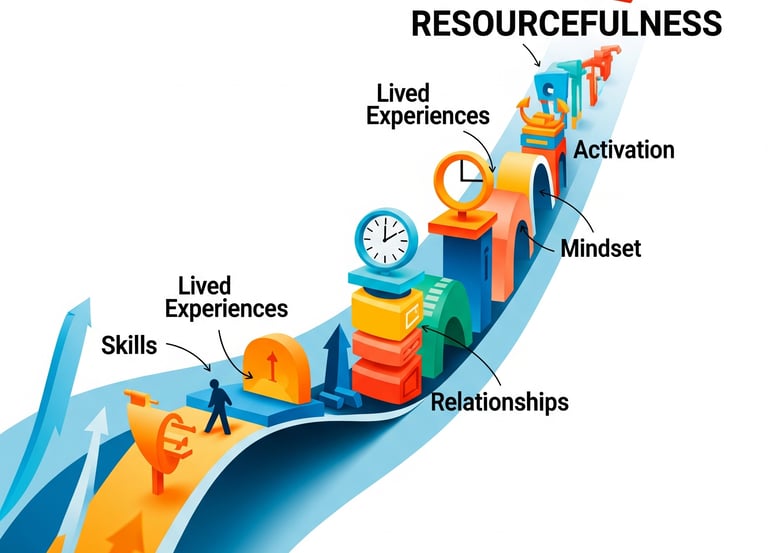🌊 The Nature of Resources – More Than Just Things
Some people inherit resources. Others build them, piece by piece, from nothing but intention.
REFLECTIONS & SOUL JOURNALS
Lr
7/28/20257 min read
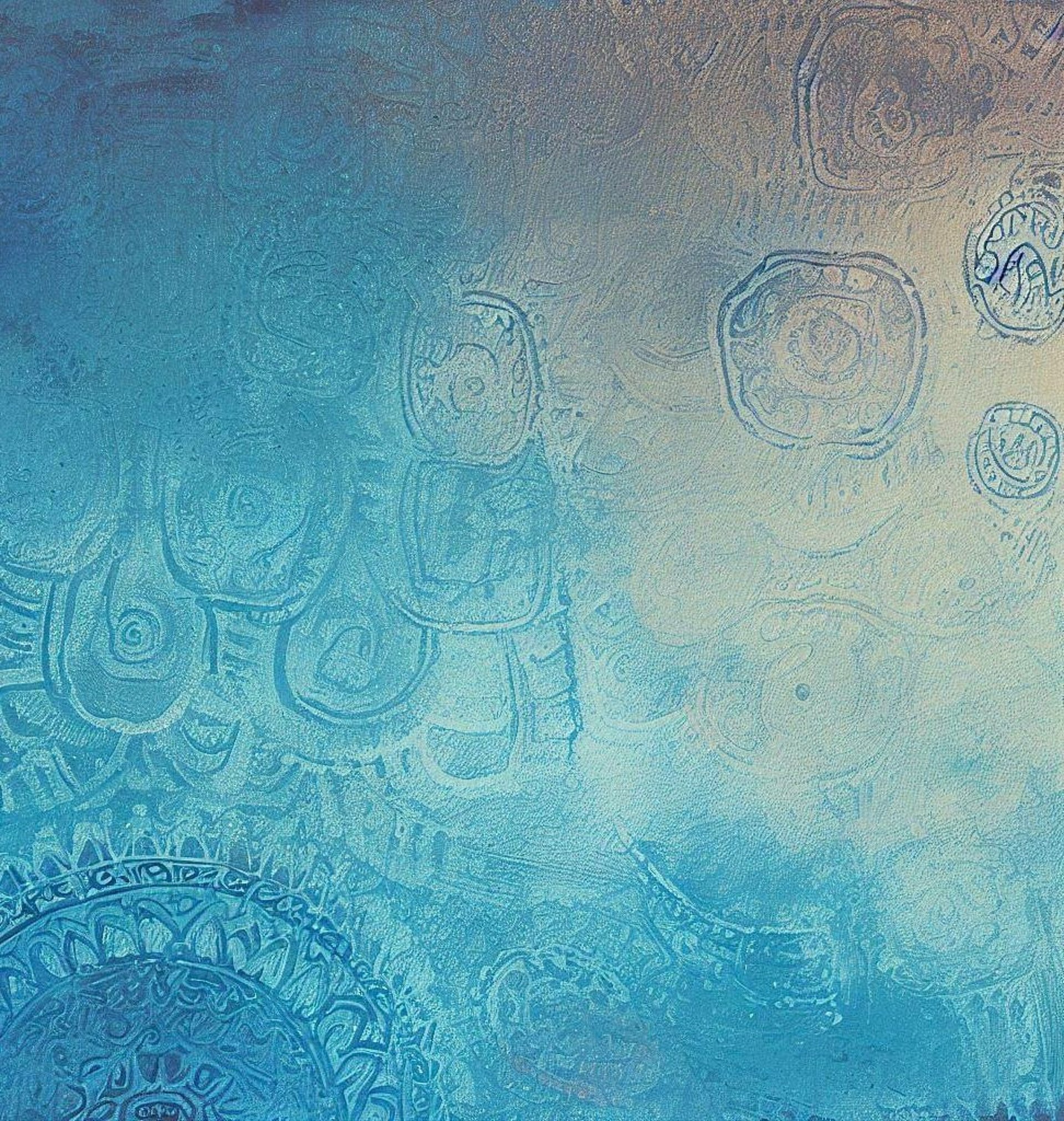


I once sat at my kitchen table with nothing but a blank notebook, convinced that real progress was out of reach because I lacked money, experience, connections—all the “resources” that seem to decide who gets ahead. Yet, in hindsight, my real breakthroughs came not from new acquisitions, but from how creatively I used what I already had: an internet connection, a late-night coffee, an old friend’s advice, a dog-eared library card. The story of every leap in my life started with spotting overlooked possibilities in what was already within my grasp.
We often define resources simply as money, land, or raw materials. Yet, at its core, a resource is more than just a thing—it can be anything that has a use, it is a carrier of capabilities, a vessel brimming with hidden potential waiting to be harnessed for meaningful progress. Resources span the tangible—tools, buildings, energy—to the intangible, like skills, knowledge, time, and even relationships. Without resources progress stalls, in expense of resources we have motion or progress. Picture a vast ocean, deep and full of life, much like a library filled with wisdom waiting to be explored. Or consider the quiet strength of a person’s education, silently empowering solutions to future challenges. Without this rich interplay of resources, true advancement halts.
Just as oceans store and regulate life on Earth, books and skills accumulate knowledge across generations, offering solutions to new problems. Human creativity constantly births new resources, much like AI and robotics which today offer powerful tools for environmental monitoring and marine conservation. These technologies hold the promise of understanding and protecting our ocean ecosystems, often invisible to the naked eye, and preserving them for future generations.
Scarcity sharpens the value of resources—whether it’s fresh water in arid lands or rare marine species under threat. Our quest for improvement, much like the ebb and flow of tides, is driven by what can nourish and uplift us.
⚡ Resources vs. Context:
The Alchemy of Value
A resource by itself is simply potential without value, waiting for context and creativity to spark transformation. Having vast land or deep pockets is futile without the skills or vision to wield them — a truth that resonates deeply with my intuition: the value lies not in possession but in meaningful use.
Scarcity, a fundamental economic force, inflates value, yet true worth only blossoms when these resources align with real needs or aspirations. Innovation shines brightest in the dance of novel combinations—much like how AI integrates diverse datasets, or how marine biologists combine robotics and data to conserve endangered species.
The “progress economy” thrives on creativity: recombining existing resources or inventing entirely new ones. The magic emerges through integration and inspired use, reflecting the one’s drive to create meaningful change often from humble origins.
🌍 Uneven Distribution:
The Divide That Shapes Worlds
The distribution of resources—fresh water, fertile land, or ocean wealth—is uneven, a global mosaic with sharp contrasts. Where we are born deeply colors our access. As much as the sea flows freely, the reality of resource inequality is a dam breaking against dreams, yes the oceans have actual natural boundaries.
When technology and fertile land cluster in pockets, rapid growth coexists with environmental degradation and social distress. The story of Easter Island stands as a powerful allegory—its ecological collapse reminds us how overusing natural riches threatens the future. Today, ocean ecosystems face similar risks: pollution, overfishing, and climate change test the resilience of marine life, the very backbone of planetary health.
On a personal level, resource gaps mirror the broader oceans of inequality: some swim in abundance, others struggle to keep afloat. Yet, knowing full well, resourcefulness, resilience, and vision can spark breakthroughs, even in scarcity.
🧠 Beyond Resources: The Quiet Forces of Success
Success is a woven tapestry of resources, effort, creativity, timing, and sometimes the serendipity of life’s tides.
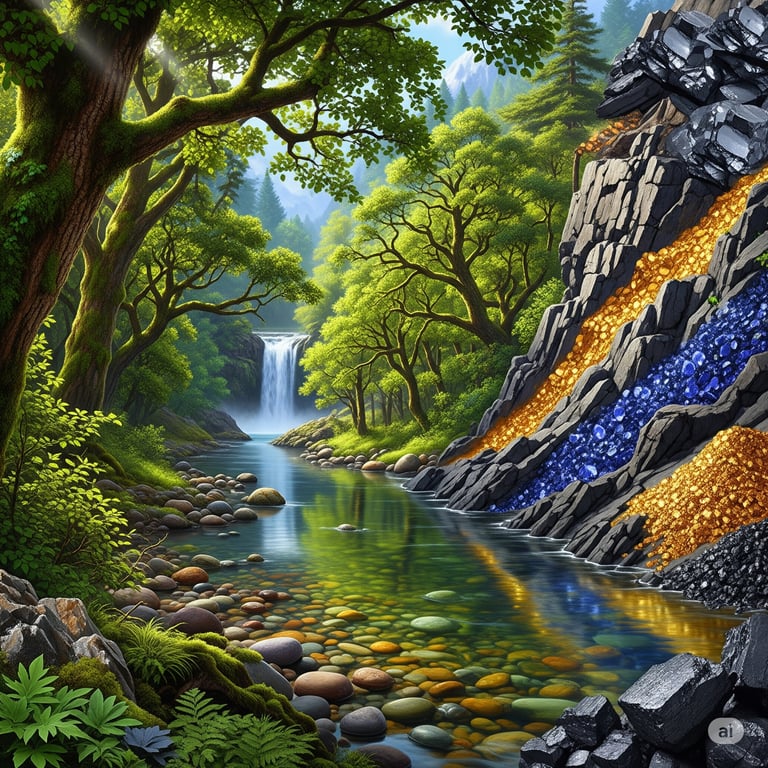

Achievement transcends resources and effort; it soars on the wings of human qualities. Angela Duckworth’s studies highlight grit: passion and perseverance as key predictors of success. Alongside intelligence and fitness, these traits form an inner reservoir—a kind of psychological capital invisible but profound.
Much like AI systems learn and adapt, humans grow through experience, learning, and persistent will. Starting conditions—family, geography, education—shape the first currents of our journey. But human capital, including knowledge, health, and skills, can expand and evolve, contributing to 2/3rd of the story, just as robotics extend our abilities to monitor and heal marine environments.
🚀 Cultivating and Using Resources:
Practical Wisdom for Young People
How do we, especially young seekers, cultivate meaningful resources? How can AI and robotics inspire personal development, while honoring our fragile blue planet?
Invest in Skills and Education: Continuous learning is key—embrace formal education, online courses, or self-study. As you grow your human capital, think about marine biology, AI programming, or robotics: these fields are the frontline of ocean conservation, blending your skills with urgent planetary needs.
Manage Time Wisely: Time is finite—prioritize with intent. Small, consistent steps accumulate, much like gradual oceanic shifts that shape entire ecosystems. Use tools to organize and focus your efforts, stretching your most precious resource.
Network and Collaborate: People are resources: mentors, friends, and collaborators. Join communities that share your values—environmental groups, AI forums, or psychological support networks. Together, your resources intertwine, creating opportunities unreachable alone.
Be Creative and Innovative: Blend what you have in new ways. Like repurposing marine drone tech to monitor coral reefs or swapping skills to build an app that maps ocean pollution. Innovation thrives on curiosity and imaginative recombination. INFJs, with their visionary thinking, are naturally poised to pioneer these breakthroughs.
Seek Opportunities Boldly: Scholarships, community programs, environmental grants—all doors waiting to be opened. Sometimes a single opportunity shifts your entire trajectory.
Save and Allocate Wisely: Guard your energy and resources. Budget finances carefully. Maintain health and well-being—your personal ecosystem. Without vitality, no achievement flourishes.
Practice Resourcefulness and Resilience: When resources dwindle, adaptation is your ally. History is replete with those who started from little but built legacies. Keep pivoting, keep learning. Your inner grit is a resource as powerful as any AI.
Never stop asking: How can I use this skill, this connection, in a new way? What can I learn next to enrich my inner and outer toolkit?
🌱 Precious Resources to Protect
Not all resources are infinite. Stewardship is essential—especially of those sustaining life and progress:
The Environment: Oceans regulate climate, feed millions, and nurture biodiversity. Yet pollution, acidification, and overfishing threaten marine life’s delicate balance. Protecting these resources means sustaining ourselves. Robotics and AI are emerging as powerful allies in this mission, enabling detailed monitoring and cleaner oceans. Guard air, water, soil, and forests as sacred trusts.
Knowledge and Information: Data and wisdom fuel progress. Protect privacy, intellectual property, and encourage sharing. Teaching multiplies knowledge—a profound resource expansion. INFJs often find deep meaning in sharing knowledge to empower others.
Social and Human Capital: Trust, community, health, and morale form the glue of thriving societies. Nurture kindness, honesty, and supportive networks. Equitable societies fare better and last longer.
Personal Time and Energy: Your own life force cannot be replaced. Prioritize tasks that reflect your purpose, set boundaries to prevent burnout, and recharge regularly. No external resource substitutes personal well-being.
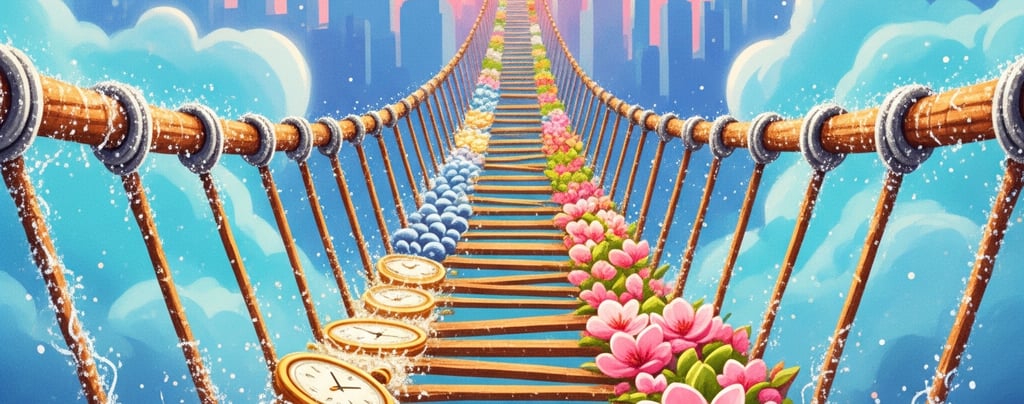

🌟 Conclusion:
Grow, Give, and Ground Your Purpose
Life’s impermanence reminds us: we leave with nothing but the echoes of how we spent our time and shared resources. The true value of any resource is the progress or meaning it helps create.


For young seekers, growth is a sacred journey of accumulating rich, quality resources—skills, relationships, knowledge—ethical in use and generous in sharing. Stay curious, continue learning, and teach what you know; such investments resonate beyond the self.
Most critically, align your resources with a larger purpose. Ground yourself in practical action, yet keep sight of the philosophical heart guiding your quest. In doing so, you not only advance your personal journey but also contribute to a more just, sustainable world—where resources serve all life, above and beneath the waves.
🚀 TL;DR
Resources go beyond money and materials: They include skills, knowledge, time, and relationships.
Value of resources depends on use: A resource alone is just potential; creativity and context bring value.
Resources are unevenly distributed globally and personally, affecting opportunities and sustainability, especially in oceans and marine environments.
Success is a mix of: resources, effort, creativity, timing, grit, and resilience.
Practical ways to build resources:
Invest continually in learning and skills.
Manage your time effectively.
Build and nurture your networks.
Think creatively to combine or repurpose resources.
Seek opportunities like scholarships or grants.
Save and maintain your personal energy and health.
Stay adaptable and resilient when facing scarcity.
Protect crucial resources:
Environment (oceans, water, air, soil).
Knowledge and information (share and protect).
Social and human capital (trust, community, health).
Personal time and energy.
Align resources with purpose: Use what you have intentionally to create meaningful progress for yourself and the world.
Share and teach: Knowledge grows when shared; generosity multiplies impact.
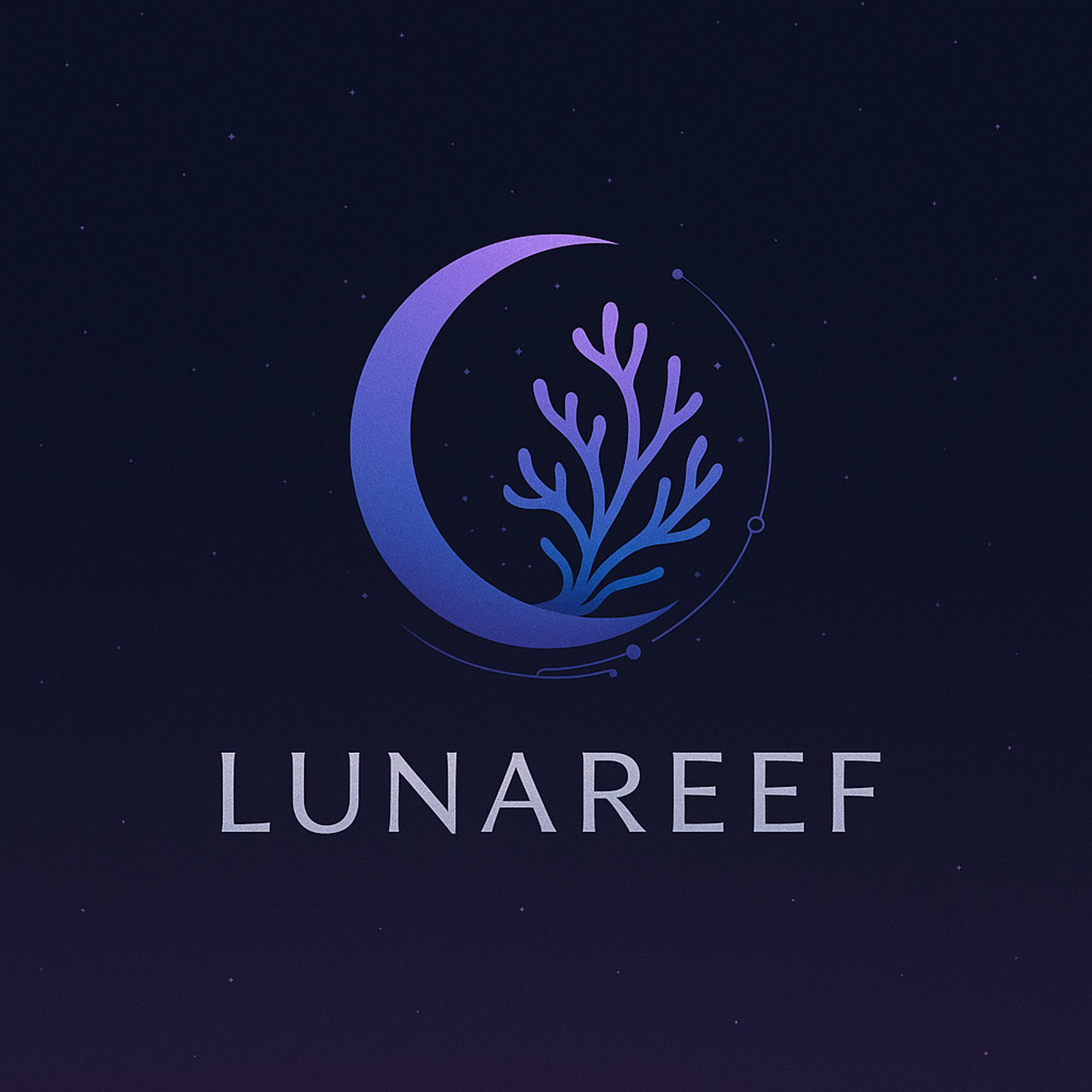
Sources
Vargo et al., “Human ingenuity continues to spawn countless resources”
A foundational article discussing human ingenuity and the evolution of the concept of resources, particularly in marketing and economic theory:
Evolving to a New Dominant Logic for Marketing (Sage Journals)
Angela Duckworth’s research on grit at West Point Academy
Coverage and explanation of Duckworth’s research focusing on grit, cognitive ability, and achievement at West Point:
Angela Duckworth finds grit is not always the best predictor of success (The Daily Pennsylvanian)
Angela Duckworth and the Research on 'Grit' (American Public Media)
McKinsey analysis on human capital and wealth
A comprehensive McKinsey report detailing how human capital comprises about two-thirds of total individual wealth globally:
Human capital at work (McKinsey Global Institute)
Environmental case study of Easter Island
Recent reevaluations and classic discussions about ecological collapse or resilience on Easter Island:
New study debunks myth of Easter Island's ecological collapse
Challenging Easter Island's collapse: the need for interdisciplinary research (Frontiers in Ecology and Evolution)
United Nations Sustainable Development Goals on resource sustainability
The official UN page summarizing SDGs, especially those that focus on sustainable resource usage:
Sustainable Development Goals (UNDP)
THE 17 GOALS | Sustainable Development (UN SDGs)

